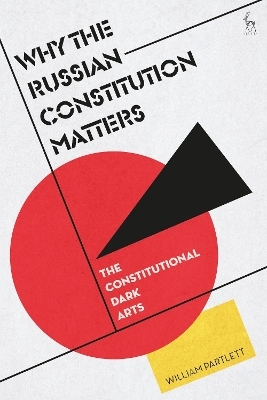
Why the Russian Constitution Matters
The Constitutional Dark Arts
Seiten
2024
Hart Publishing (Verlag)
978-1-5099-7220-3 (ISBN)
Hart Publishing (Verlag)
978-1-5099-7220-3 (ISBN)
This book challenges the common view that the Russian Constitution is a sham or a reflection of Russia’s authoritarian past.
It instead shows that the Russian Constitution was a product of the constitutional ‘dark arts’, an increasingly common constitutional practice that seeks to guarantee liberal democracy and individual rights in a system of highly centralised power.
Over time in Russia, the centralisation of power in the president has undermined the constitution’s democratic and rights protections. This Russian experience matters for three reasons.
First, it shows that Russian authoritarianism is neither the personal creation of Vladimir Putin nor a natural reflection of Russian history. It is instead the product of a centralised constitutional system. A democratic Russia is possible but requires more than just Putin leaving office - it also requires breaking with Russia’s constitutional commitment to centralisation.
Second, it demonstrates the role that the constitutional dark arts play in populist authoritarianism around the world. In these contexts, centralisation allows one office to claim popular legitimacy and dominate politics while (generally falsely) also claiming to respect individual rights and democracy.
Third, it reveals that democratic constitutions are more than legal texts enforced in court. They are more fundamentally political texts that create a balanced state with political checks on the centralisation of political power. These checks and balances do not just limit state power and protect rights; they also enable the state to better understand and advance the general well-being of its citizens.
This book therefore provides critical guidance to those involved in building democracy in a post-Putin Russia. It is also important to those seeking to better understand the role that constitutions play in shaping both authoritarian and democratic politics.
It instead shows that the Russian Constitution was a product of the constitutional ‘dark arts’, an increasingly common constitutional practice that seeks to guarantee liberal democracy and individual rights in a system of highly centralised power.
Over time in Russia, the centralisation of power in the president has undermined the constitution’s democratic and rights protections. This Russian experience matters for three reasons.
First, it shows that Russian authoritarianism is neither the personal creation of Vladimir Putin nor a natural reflection of Russian history. It is instead the product of a centralised constitutional system. A democratic Russia is possible but requires more than just Putin leaving office - it also requires breaking with Russia’s constitutional commitment to centralisation.
Second, it demonstrates the role that the constitutional dark arts play in populist authoritarianism around the world. In these contexts, centralisation allows one office to claim popular legitimacy and dominate politics while (generally falsely) also claiming to respect individual rights and democracy.
Third, it reveals that democratic constitutions are more than legal texts enforced in court. They are more fundamentally political texts that create a balanced state with political checks on the centralisation of political power. These checks and balances do not just limit state power and protect rights; they also enable the state to better understand and advance the general well-being of its citizens.
This book therefore provides critical guidance to those involved in building democracy in a post-Putin Russia. It is also important to those seeking to better understand the role that constitutions play in shaping both authoritarian and democratic politics.
William Partlett is Associate Professor at Melbourne Law School, Australia.
Introduction
1. The Constitutional Dark Arts: Concept and Consequences
2. The Russian Democratic Constitutional Movement
3. The Foundation of the Constitutional Dark Arts in Russia
4. The Personal President (1994–99)
5. The Managerial President (2000–08)
6. The Constrained President (2008-12)
7. The Imperial President (2012 – the Present)
8. Constitutional Law in a Post-Putin Russia
9. Countering Constitutional Authoritarianism
10. Renewing Democratic Constitutionalism
Conclusion: Constitutions at the End of History
| Erscheinungsdatum | 03.09.2024 |
|---|---|
| Verlagsort | Oxford |
| Sprache | englisch |
| Maße | 138 x 216 mm |
| Themenwelt | Recht / Steuern ► Allgemeines / Lexika |
| Recht / Steuern ► EU / Internationales Recht | |
| Recht / Steuern ► Öffentliches Recht ► Verfassungsrecht | |
| ISBN-10 | 1-5099-7220-X / 150997220X |
| ISBN-13 | 978-1-5099-7220-3 / 9781509972203 |
| Zustand | Neuware |
| Haben Sie eine Frage zum Produkt? |
Mehr entdecken
aus dem Bereich
aus dem Bereich
Buch | Hardcover (2024)
C.H.Beck (Verlag)
CHF 104,95


